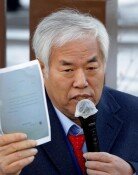[Opinion] A Country That Doesn’t Read
[Opinion] A Country That Doesn’t Read
Posted December. 24, 2002 23:02,
The common denominator of the eleven 20th Century American presidents, from Franklin Roosevelt to Bill Clinton, is that all of them used to enjoy reading books from their early childhood. The 33rd president Harry Truman was the most avid reader of them, in particular. When he stayed at a hotel in New York after he retired from the presidency, a friend of his visited him one day. He found a pile of books stacked beside a chair in the room, and said ˝You must read a lot of books to fall asleep well at night.˝ Then, Truman replied. ˝No, I read them to keep myself wake up.˝
▷Public libraries across the country contributed greatly to the reading habit of Americans. From the early years of the country’s history, it was a public library that first appeared when a village was formed. It was located at the center of the village as a place for spending good time. Truman, born in a small town in Missouri, read out all of the books kept in the town’s library when he was 13 to 14 years old. ˝It was the library in our village that made what I am today,˝ said Bill Gates, Microsoft Chairman and one of the richest men in the world. It was public libraries that gave birth to the president and the affluent businessman.
▷According to a recent survey, 28% of the adult population in this country have not read one single book for the last one year. The Korea Publishing Culture Research Institute conducted a survey in November among 1,200 adults and 3,000 students across the country, and found that people spend average 31 minutes a day to read books during weekdays and 29 minutes on weekend. The figure increase to 67 minutes when including newspaper, magazines and comic books, which is only about a half of the time they spend watching the mass media such as TV. Students are better than grown-ups, Elementary school students read 20.5 books and high school students 6.6 books during a semester, which sill far lags behind the numbers in advanced countries.
▷As witnessed in the successful case in the U.S., there must be a number of public libraries so that people can easily access to books. But we have only 403 public libraries throughout the country. 16 public libraries are in Seoul where more than 10 million live. 19.6% of elementary, middle and high schools do without school libraries. Then, this country’s propensity not to read is not just people’s fault. The government recently decided to build libraries for every each school nationwide by 2007. A non-profit organization called `Society for Reading Books` set a plan to host a `class book essay festival` to make every class a small library where students read books. These are welcoming signs. We hope that by reading books, our children learn to understand the simple truth - `the world has been formed and ruled by books.`
Mun Myeong-ho, Editorial Writer, munmh97@donga.com



![[속보]윤석열 사형 구형…내란특검 “전두환보다 엄정히 단죄해야”](https://dimg.donga.com/c/138/175/90/1/wps/NEWS/IMAGE/2026/01/13/133151283.1.jpg)



